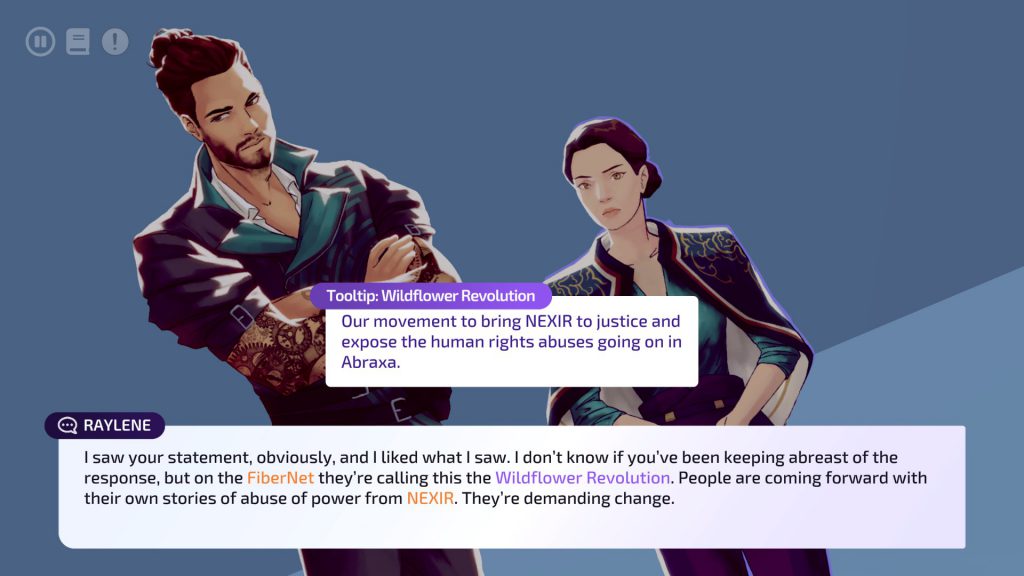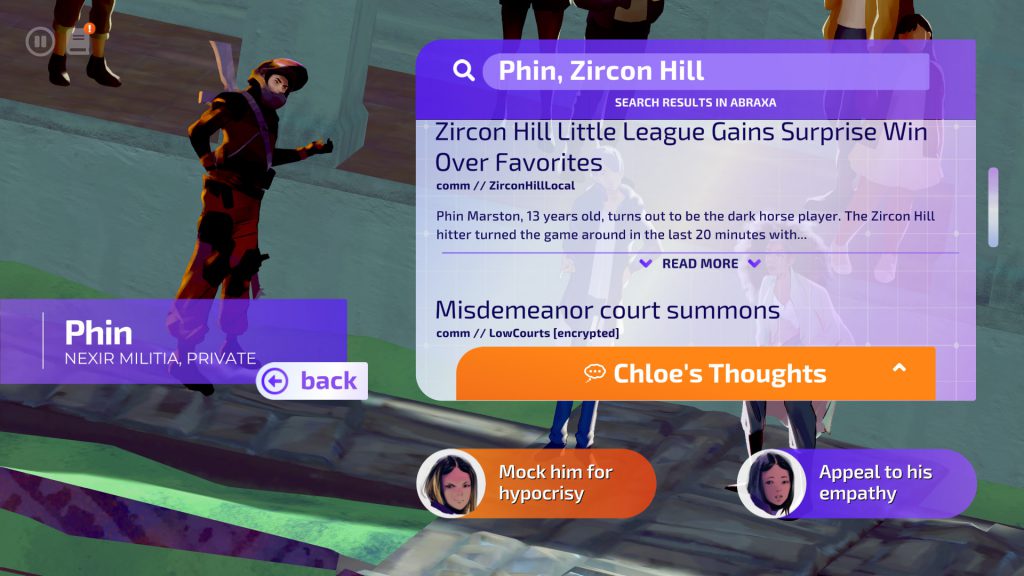Solace State puts you at the heart of a political, emotional powder keg
Technology races ahead, authoritarianism is at a concerning high and activists are being suppressed. Solace State is a narrative adventure game that puts you right in the thick of a political hotpoint.
It’s easy to look at Solace State‘s winding story and draw parallels to both modern society, however, it also spends a lot of time nudging at massive underlying dynamics that repeat back not only from the last few hundred years, but from the dawn of society. Power, be that over people or over person, unquestioned use of force, political and social manoeuvring and more are at the heart of Solace State‘s emotional narrative. These things are core to its ragtag group of main characters, and their ability to control knowledge, how people are seen, how people think and how people feel. These things are all things that we, you and I, all have some degree of power in our own way, but Solace State‘s extreme scenario and history underlines the strange world we’re in as a not-so-futuristic-seeming cyberpunk setting.
Whistleblowers, activists, and protectors turning into oppressors are things that are, well, timeless. However, Solace State‘s world is one filled with celebrities and broadcasting networks, and the militia goons are armed with guns — there’s political unrest, but the city it takes place in is authoritarian politically, so the populace is sceptical of anybody promising change. It’s an overflowing powder keg, and by the time the protagonist — Chloe, an Iconohacker — reaches town, it’s already started to detonate.
Iconohackers are a type of person who can alter the world around them like a hacker, but without requiring any interface. In the case of Chloe, this means that she can spike people’s adrenaline, read people’s recent history and socials, or even create a fake identity for people all while conversing with, or in the vicinity of, them. It’s an incredible social power that fits the narrative adventure format well, there are also handy history and encyclopedia features that are easy to navigate and help out if you’ve forgotten things or accidentally clicked past parts of the conversation. ‘Forgotten Things’ might sound a little silly, but you’re looking at between 5-8 hours for your first playthrough, which is no mean feat, and while it’s split up into chapters and acts there are no obvious indicators about how fast you’re speeding to its ending.

That said, rushing to the end is likely not anybody’s prerogative, there are a lot of cool elements — both visual and audible — that really, really immerse you into a setting: The first is that the camera pivots around the scene between paragraphs, sliding between buildings, around rooms and across space between many of the prompts. This is amazing and really helps convey not just the space that the characters occupy, but also a passage of time. Secondly, the audio is phenomenal. On the title screen, there’s a beautiful, slow and thoughtful piece that plays, but during the game, there’s a whole array of background beats that match the onscreen action. That music not only sets a pace and a mood, but it jars you and puts you on edge when it falls to silence, which often matches the most emotional, or thoughtful scenes.
There are a lot of emotional moments, a shocking amount, and that’s because the characters are all really well-written. There’s a habit in video games to try and squeeze a full character development into an hour or so, in Solace State there’s a very clear awareness that the idea of losing your humanity and becoming numb to a violent world isn’t something that happens quickly, or at all, in most people. Characters are shocked, stunned and immobilised by the fear of what they see — they reflect on their traumas, and they are reluctant to discuss things that have caused them harm. It’s an incredible feat of writing, and if not better than you’d find in most TV dramas then it certainly feels more compelling.

That said, I have got a few negatives, but I feel like a lot of those are personal. There’s a fair bit of onboarding for Chloe’s powers compared to how they’re actually used; the start of the game spends quite some time explaining the danger of using your powers too aggressively, but the need to do it is low, and the UI presents little indication that it’s risky. Similarly, the options felt as though they did influence the story, however, you can navigate around various conversation options before choosing (something I did forget, so maybe a bigger ‘back’ button would help) and, ultimately, the order you take them in doesn’t feel relevant. That does make me wonder if the whole thing could have been more on the rails, but maybe that was a deliberate design choice.
There are a lot of things to love about Solace State, but I think the one thing that sticks with me the most — even more than the damn good, emotional writing — is how much care was put into writing the different classes. The working class, the middle class and the upper, political class are identifiable without even clicking on their names to activate their info-panel tooltip. The fact that a major potential political ally speaks in riddle-like idioms that are beyond the highly-educated, university graduate protagonists is an amazing piece of writing that very quickly betrays the elitist, private education that the individual received. That attention to detail, and careful design, was amazing. The moment the character started talking, a part of my poor, working-class child heart sent a message to my brain to not trust them… there’s some real magic in writing that can do that.
Solace State is easily one of the stand-out narrative games that I’ve played this year; it’s politically charged, emotional and beautiful.
Solace State is available now for Windows and Xbox
Comments are closed.